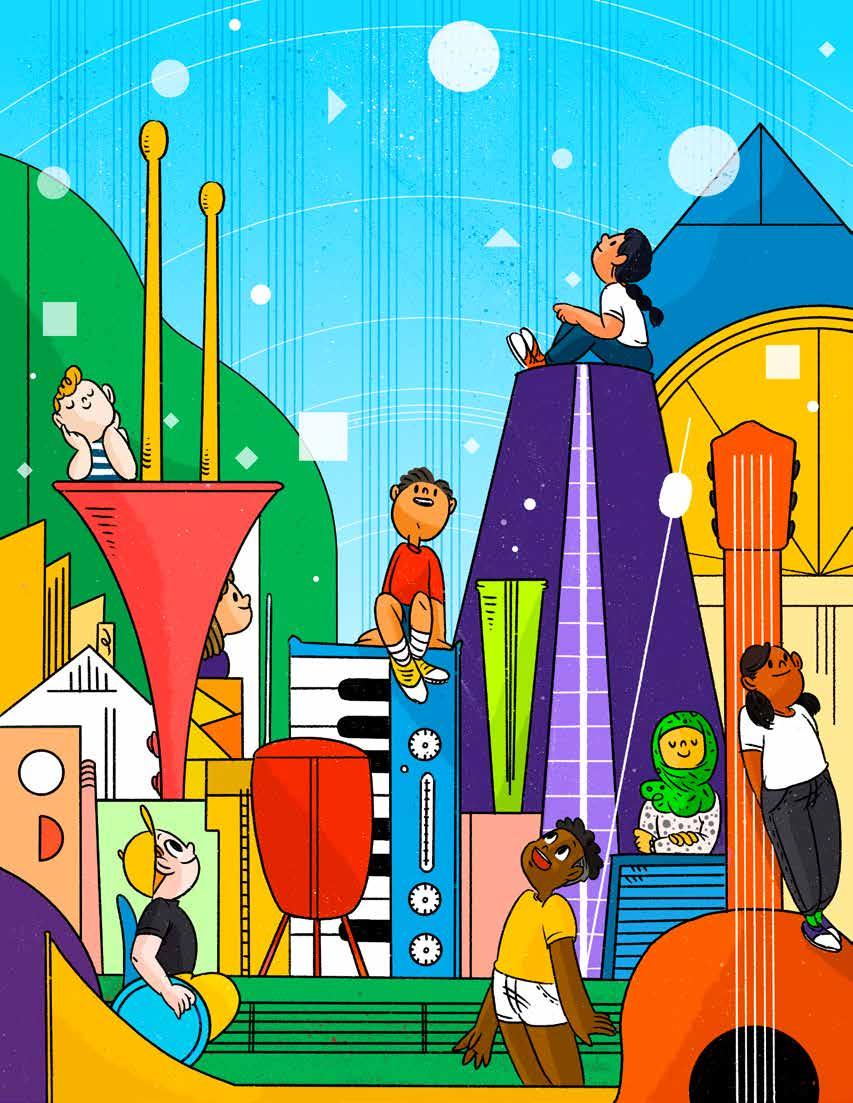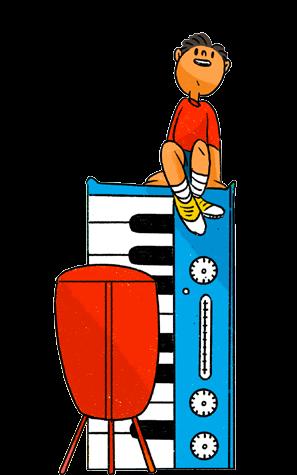
8 minute read
The Music Matters
Looking for a new better in Elementary Music Education Matters
By Carolyn Lewis and Kevin Merkley Illustration by Suharu Ogawa
Advertisement
Before the pandemic, music programs invigorated our schools. They provided a sense of community, a joy and energy that sparked life in a school and helped students connect to their school and sense of self. Students could be heard singing, playing instruments and responding to music using a myriad of tools. They shared a sense of connection and pride through music.
Creativity abounded throughout our school buildings. Music-making provided the creative and critical thinking learning opportunities so valued by many. Since the onset of this pandemic, and the difficulties around music programming within a COVID-19 landscape, music educators have had to work very hard to maintain this level of energy, positivity, enthusiasm and educational experiences to the best of their ability – despite the restrictions imposed by boards responding to public health recommendations.
Music Education in the Pandemic
There are three factors that impact a highquality music program in our elementary schools: an inspired, qualified Music Educator; a supportive school administrator; and a school community to support the Music Educator.
Since school closures in March 2019, the demands on school administrators and our staff have been great. In many areas of the province, the loss of wind and brass instruments, singing and other instrumentallybased music programs in our schools has been evident. Music teachers have demonstrated diligence, dedication and creativity in the relentless pursuit of providing a rich musical learning environment for their students while keeping them safe.
Due to the challenges of navigating education during a pandemic, music teachers have been redeployed, are teaching homerooms or have minimal time with students to teach music programs. The new reality is that staff numbers in-school have been minimized, and/or students have been organized into cohorts. In some boards, music rooms are idle with instruments sitting on shelves. In others, music rooms are being used for the storage of extra desks or are vacant due to the fact that students and their families have chosen to move to virtual classrooms.
Depending on location, some boards are permitting instrument playing with safety protocols in place, while others are not allowing any playing or singing as a result of advice from local public health organizations.
It has been a challenge for our passionate and creative music educators who understand the power music has for the well-being of students. It has been difficult for some students to adjust to being in school where their love of music has been removed or diminished as a result of new safety protocols.
The Vol. 12, No. 1 issue of "The Register" included an article by Terry Sefton and Jonathan Bayley called “Stop calling it ‘Prep’!’”, highlighting their research on the implementation of the revised Arts Curriculum, noting that, “principals have a vital role to play in offering leadership and support for their staff.”
This statement is more important than ever, and as educators we need to give some serious thought to how we are going to reengage our music programs, re-inspire our music specialists and ensure that the structures and processes (staffing, timetables, room allocation, maintenance and purchasing of instruments and materials) will best support our music programs in returning to a “new better” for music education.
Mental Health and Well-being of Students, Schools and Communities
During the early months of the COVID-19 pandemic, people from around the world joined together, through music and the arts, to feel part of a community and to calm the stressful effects of the ever-growing pandemic. The idea that music and the arts have become the “antidote” for the pandemic is obvious, and why students absolutely need to continue to have access to these valuable learning opportunities when they return to school. We know that some students may have experienced loss, grief, trauma, or other mental health challenges.
In addition to the intrinsic benefits of studying music, there is a vast range of other skills, attitudes and ways of seeing and thinking that are supported through music education. Connections to overall academic success have been noted, and the Critical and Creative processes, cornerstones of The Ontario Arts Curriculum, support 21st Century skills in critical thinking, creativity and collaboration.

Return to Making Music
During the summer of 2020, the Ontario Music Educators’ Association created, "A Framework for The Return to Music Classes in 2020-21". This resource has drawn upon leading research and recommendations for how music curriculum can be delivered within the parameters provided by school boards, informed by the recommendations of local public health agencies. This document remains the most current and is updated when new information and research becomes available. The OMEA continues to pursue discussions with the government and health officials across the province to move forward with safe music learning in our schools.
Currently, most overall expectations in music can be met without the use of instruments in both the elementary and secondary Arts Curriculum. Learning how to code without being able to use a computer is also possible, but having a computer (or tool) to apply your knowledge is essential. The same is the case for music, which does require a variety of tools – such as instruments – to fully express oneself and to fully engage with the Ontario curriculum.
The July 2020 Hospital for Sick Kids report, "COVID-19: Guidance for School ReOpening", recommended that given the current situation to reduce the transmission of COVID-19, playing wind instruments or singing should not be permitted until such time as we are able to safely return to these activities, depending upon local considerations, space and adherence to safety protocols.
When we are able to return to making music, in what will be our “new normal,” as school and system leaders our greatest influence in impacting the quality of opportunities available to our students as they engage in music education is through staffing and timetabling. When staffing, engaging current staff who have the musical background, qualifications and the ability to inspire our students should be a priority to ensure quality programming and community building.
Principals may also have the ability to hire a new staff member who brings this skill-set to our schools. We also want to ensure we allocate enough time to allow music-making to flourish. The Arts Education Consultants of Ontario has published "Recommended Elementary Instructional Practices and Time Allocation Guidelines: The Arts", which provides school leaders with all of the instructional and time allocation considerations needed for planning and implementation of elementary music and the arts. This document can support administrators in renewing music programs to create a “new better” for students and the entire school community.
The "2018 People for Education Arts Report", “emphasizes continuing deficits and inequities in the music education offered to the children of Ontario, while at the same time offering at least a glimmer of hope that better things may be on the horizon” ("Concern and Hope: An Ontario Music Educators’ Association response to the 2018 People for Education Arts Report"). People for Education notes that the percentage of schools indicating that they have a qualified music teacher delivering the music program is up slightly from 41 per cent to 46 per cent, but also indicates 40 per cent of students have no music instruction at all in their school day, qualified or unqualified (Concern and Hope, 2018).
This pandemic has had a significant impact on how schooling has been offered to our students. Our teachers and systems have demonstrated flexibility and innovation. As leaders, we have an opportunity, and an obligation, to ensure we are seeking out music specialists who can inspire our students, as well as further develop critical thinking and creativity skills and additionally bring our communities together when schools return to a “new” normal.
Conclusion
Music Education is going to be needed more than ever once all our students return to our buildings, following what has been a challenging year in 2020–21. Music is part of who we are as humans. It is rooted deep within the identities of the students we serve and it connects students, schools and communities together as they learn and grow. Let us ensure that our engaging and creative music programs not only return to a “new normal,” but are revitalized to create a “new better!”
Supports Available for Administrators
The Ontario Music Educators’ Association has a group of current elementary and secondary administrators who are available to provide support in returning your school to a “new better” as boards and schools continue to plan for music education in schools. The OMEA Administrator Advisory Council (AAC) is willing and available to work together to find viable solutions for this important work to maintain the rich, creative, collaborative musical experiences and cultural learning so important in children’s education. Below are some recommended supports that are available:
• The Ontario Music Educators’ Association "A Framework for The Return to Music Classes in 2020-21" was created to assist boards in planning the safe return to music classes and is available in English and French. It is also available through the OMEA website omea.on.ca. This document is reviewed and updated periodically as new information becomes available.
• Timetabling: Contact members of the Ontario Music Educators’ Association Administrator Advisory Council (AAC) are available to assist and provide guidance to school boards with regards to timetabling Music Education. Contact aac@omea.on.ca.
• Music consultants within school boards: Consult with school board Music instructional program leaders/consultants/teacher leaders, and administrators who are former music educators to seek advice and guidance. Refer to "Recommended Elementary Instructional Practices and Time Allocation Guidelines: The Arts" for further information.
• Consult with colleagues in administration who are former music teachers who will be able to support you in creating a “new better.”
Carolyn Lewis recently retired as a principal with the Halton District School Board and is currently the president of the Ontario Music Educators’ Association (OMEA). Email: president@omea.on.ca Kevin Merkley is currently principal at Stonebridge Public School in the York Region District School Board. He is the director for the Administrator Advisory Council on the Ontario Music Educators’ Association (OMEA) board and is also the Secretary for Musicfest Canada. Email: aac@omea.on.ca Twitter: @OMEAOntario









